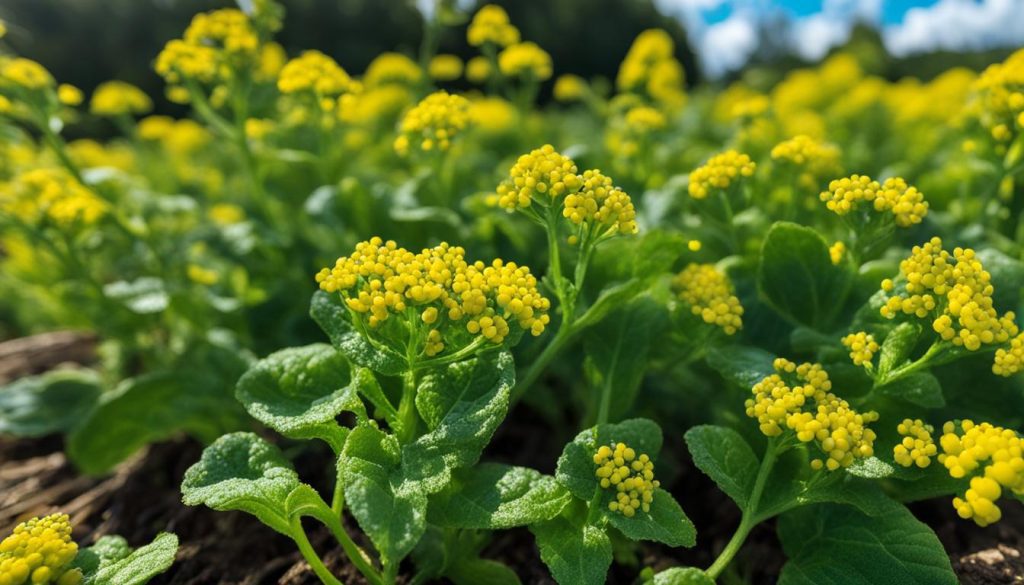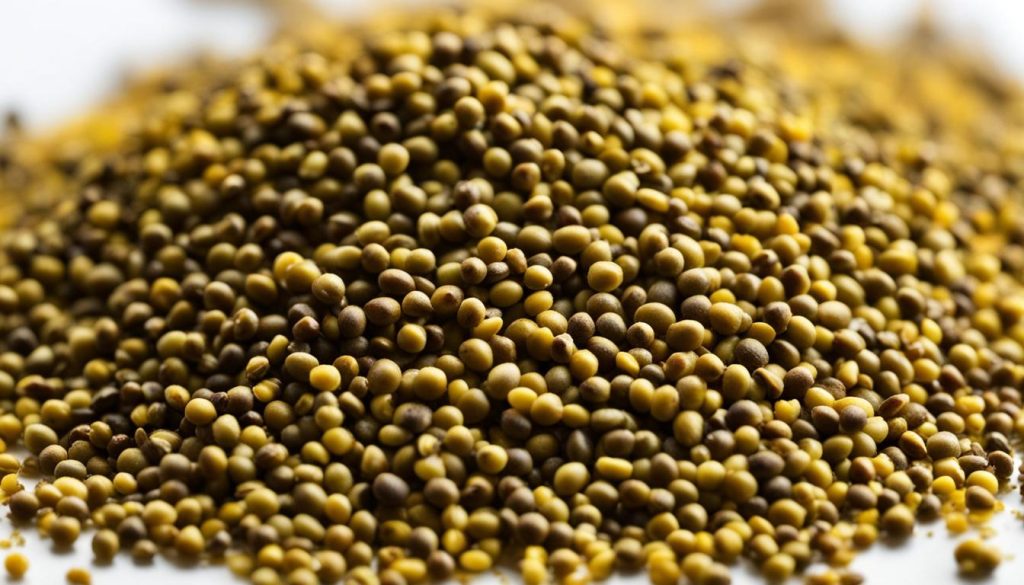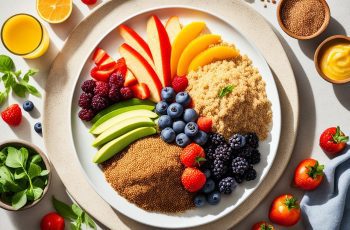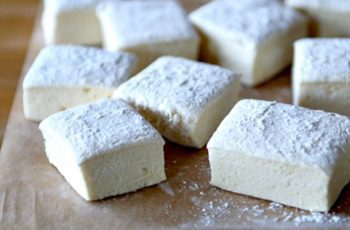Mustard seeds have been used for centuries for their medicinal properties and have been a staple ingredient in Ayurvedic formulations. These small but mighty seeds contain bioactive compounds like sterols, glucosinolates, and isothiocyanates, which are responsible for their health benefits. Not only are mustard seeds packed with essential nutrients such as carbohydrates, proteins, fats, fiber, vitamins, and minerals, but they also possess powerful therapeutic properties that can contribute to overall wellness.
Health Benefits of Mustard Seeds
- Mustard seeds contain bioactive compounds that provide a range of health benefits.
- They have anti-inflammatory properties and may help reduce pain and swelling.
- Mustard seeds show potential in inhibiting the growth of cancer cells and protecting against ulcers.
- They have antibacterial and antifungal properties and can aid in the relief of digestive disorders.
- It is important to consult a healthcare professional before incorporating mustard seeds into your diet, especially if you have pre-existing conditions or are taking medication.
Nutritional Value of Mustard Seeds
Mustard seeds are a tiny powerhouse of essential nutrients that provide numerous advantages and benefits for the body. These small seeds are packed with a wide range of vitamins, minerals, and other essential components that support overall health and wellness.
Let’s take a closer look at the nutritional composition of mustard seeds. They are a rich source of minerals such as iron, calcium, magnesium, phosphorus, and selenium, which play vital roles in maintaining the proper functioning of the body.
In addition to minerals, mustard seeds are also loaded with an impressive array of vitamins. They contain vitamins A, B1, B2, B3, B5, B6, B9, C, E, and K, which contribute to various bodily functions, including supporting the immune system, promoting healthy skin, aiding in digestion, and boosting overall energy levels.
Furthermore, mustard seeds offer a good balance of macronutrients. They provide carbohydrates, proteins, and healthy fats, all of which are necessary for energy production, tissue repair, and maintaining healthy bodily functions. The fiber content in mustard seeds aids in digestion, promotes satiety, and helps regulate blood sugar levels.
Mustard seeds also contain essential trace minerals like copper, zinc, and manganese, which are involved in enzymatic reactions, antioxidant defense, and the maintenance of strong bones and teeth.
Overall, the nutritional value of mustard seeds is impressive. Their composition of vitamins, minerals, carbohydrates, proteins, fats, and fiber makes them a valuable addition to a healthy diet.
Next, we will explore the specific health benefits that mustard seeds offer to the body, including their potential anti-inflammatory, antioxidant, and anticancer properties.
Health Benefits of Mustard Seeds
Mustard seeds offer a wide range of health benefits, making them a valuable natural remedy for various health concerns. Here are some of the key advantages:
- Reduces inflammation, pain, and swelling: The compounds present in mustard seeds, such as glucosinolates and omega-3 fatty acids, act as antioxidants and help protect against damage caused by free radicals.
- Potential cancer-fighting properties: Mustard seeds have shown promise in reducing the risk of cancer by inhibiting the growth of cancer cells and protecting DNA from damage.
- Regulates blood sugar levels: Mustard seeds may be beneficial for diabetes mellitus, as they help regulate blood sugar levels.
- Antibacterial and antifungal activity: Mustard seeds exhibit antibacterial and antifungal properties, which can help inhibit the growth of bacteria and fungi.
- Treatment for respiratory congestion and psoriasis: Mustard seeds are commonly used in the treatment of respiratory congestion and psoriasis due to their anti-inflammatory properties.
- Potential neuroprotective effects: Some studies suggest that mustard seeds may have neuroprotective effects and could be beneficial for neurodegenerative disorders.
- Relieves pain and acts as an analgesic: Mustard seeds have been used as a natural pain-relieving agent and may help alleviate discomfort and inflammation.
It is important to note that while mustard seeds show promise in promoting health and well-being, further research is needed to fully understand and validate these effects. Remember to consult a healthcare professional before incorporating mustard seeds into your diet, especially if you have pre-existing health conditions or are taking medication.
Mustard Seeds for Skin and Hair Health
Mustard seeds have properties that can benefit both skin and hair health. When used as a natural scrub or combined with aloe vera gel, mustard seeds can effectively exfoliate dead skin cells and provide hydration to the skin. Their natural antioxidant properties and specific compounds have the potential to slow down the signs of aging, protect against infections, and improve skin conditions such as psoriasis.
Derived from mustard seeds, mustard oil has been found to promote hair growth and strengthen the hair. It is also known to condition the hair, leaving it with added shine and bounce. However, it’s important to note that more research is needed to fully understand and validate these specific benefits.
- Exfoliation: Mustard seeds can be used as a natural scrub to remove dead skin cells and reveal a refreshed complexion.
- Hydration: When combined with aloe vera gel, mustard seeds can provide hydration to the skin, leaving it soft and supple.
- Antioxidant properties: Mustard seeds contain antioxidants that can help slow down the signs of aging and protect against skin damage caused by free radicals.
- Protection against infections: Certain compounds present in mustard seeds have been found to possess antimicrobial properties, potentially helping to protect against skin infections.
- Skin conditions: Mustard seeds may offer relief for skin conditions like psoriasis, thanks to their anti-inflammatory and soothing properties.
- Hair growth and strength: Mustard oil derived from mustard seeds has shown potential in promoting hair growth and strengthening the hair shaft.
- Conditioning properties: Mustard oil can also condition the hair, adding shine and improving overall hair health.
It’s important to remember that while mustard seeds have potential benefits for skin and hair health, further research is needed to fully understand and validate these effects. As with any natural remedy, it’s recommended to test a small patch of skin before incorporating mustard seeds into your skincare or hair care routine. If any adverse reactions occur, discontinue use and consult a dermatologist or healthcare professional.
Other Uses of Mustard Seeds
In addition to their health benefits, mustard seeds have a variety of other uses. Here are some of the ways mustard seeds can be utilized:
- Removing odors from storage jars: Mustard seeds can help eliminate unpleasant smells from containers and keep your pantry fresh.
- Providing relief for muscle pains and back pain: Mustard seed poultices can be applied topically to reduce discomfort and promote relaxation.
- Lowering fever: Mustard seeds have been used in traditional medicine to help reduce fever. It is believed that their warming properties stimulate sweating and aid in fever reduction.
- Treating cold and respiratory congestion: Mustard seeds can be used as a natural remedy for congestion and cold symptoms. Inhalation of mustard seed steam or mustard plaster application on the chest may help alleviate congestion and promote easier breathing.
Not only used for their medicinal properties, mustard seeds are also extensively used in cooking. They add a distinct flavor and aroma to various dishes.

Mustard seeds can be used in:
- Seasoning dishes: Mustard seeds are commonly used as a spice to enhance the flavor of curries, stews, marinades, and sauces.
- Making pickles: Mustard seeds can be used in pickling to add a tangy and slightly spicy flavor.
- Preparing curry: Mustard seeds are often an essential ingredient in curry recipes, providing a unique taste and depth of flavor.
- Enhancing vegetable dishes: Mustard seeds can be sprinkled over cooked vegetables to elevate their taste and nutritional value.
With their versatility and nutritional benefits, incorporating mustard seeds into your cooking can enhance both the taste and health quotient of your meals.
Precautions and Side Effects of Mustard Seeds
While mustard seeds offer numerous health benefits, it is important to take certain precautions and be aware of potential side effects. Mustard seeds should be avoided internally if you have ulcers or thyroid disorders. It is always advised to consult a healthcare professional before consuming mustard seeds or any herbal supplements, especially if you have pre-existing conditions or are undergoing medical treatment.
Mustard seeds may interact with certain medications, such as antacids and blood thinners, so it is crucial to inform your doctor about any mustard seed consumption. Additionally, mustard seeds may have side effects such as urticaria, eczema, asthma, and allergic reactions. If you experience any adverse reactions to mustard seeds, seek immediate medical attention.
It is always better to be cautious and prioritize your health when incorporating any new food or supplement into your diet. Consulting a healthcare professional will help ensure that you can safely enjoy the benefits of mustard seeds without any potential risks.
Mustard Seeds and Traditional Medicine
Mustard seeds have been used in traditional medicine for centuries, and they play a significant role in holistic practices like Ayurveda. Throughout history, these seeds have been utilized to address various health conditions, including tumors of the thyroid gland, lymphadenitis, and rheumatic arthritis.
Ayurvedic practitioners believe that mustard seeds, whether applied externally or consumed in the form of a paste, possess unique properties that can contribute to the alleviation of these specific health concerns. However, it is important to note that further research is necessary to fully understand the mechanisms behind these traditional uses and to validate their effectiveness.
Despite the need for more scientific evidence, the long-standing presence of mustard seeds in traditional medicine attests to their perceived benefits. As modern research continues to explore the potential of mustard seeds, we may gain further insights into their medicinal properties and the ways they can enhance our well-being.

Conclusion
Mustard seeds are a powerhouse of health benefits that have been cherished for centuries. Their remarkable combination of essential nutrients and bioactive compounds makes them a valuable addition to both medicinal and culinary practices. From their ability to reduce inflammation and alleviate pain to their potential anti-cancer properties, mustard seeds have shown great potential in promoting overall health and well-being.
However, it is important to exercise caution and consult a healthcare professional before incorporating mustard seeds into your diet, especially if you have pre-existing health conditions or are taking medication. It is also crucial to remember that further research is needed to fully unravel the extent of their amazing health benefits.
With more scientific understanding and exploration, mustard seeds may emerge as a recognized natural remedy for various health concerns. So, next time you add mustard seeds to your dishes or explore their medicinal applications, know that you are harnessing the power of a tiny seed with tremendous potential to support your well-being.
FAQ
What are the health benefits of consuming mustard seeds?
Mustard seeds have numerous health benefits, including reducing inflammation, pain, and swelling, potentially acting against cancer and ulcers, and relieving digestive disorders. They may also have antibacterial and antifungal properties.
What is the nutritional value of mustard seeds?
Mustard seeds are rich in essential nutrients such as iron, calcium, magnesium, phosphorus, and selenium. They also provide vitamins A, B1, B2, B3, B5, B6, B9, C, E, and K, as well as carbohydrates, proteins, fats, fiber, and various minerals.
What health benefits do mustard seeds offer?
Mustard seeds may reduce inflammation, pain, and swelling in the body. They have antioxidant properties and can help protect against the damage caused by free radicals. Mustard seeds also show potential in reducing the risk of cancer, regulating blood sugar levels, and exhibiting antibacterial and antifungal activity.
How do mustard seeds benefit skin and hair health?
Mustard seeds can exfoliate dead skin cells, hydrate the skin, slow down signs of aging, protect against infections, and improve skin conditions. Mustard oil, derived from mustard seeds, can promote hair growth, strengthen the hair, and condition it for shine and bounce.
What are the other uses of mustard seeds?
Mustard seeds have been used in traditional medicine for various purposes and can be used to remove odors, provide pain relief, lower fever, and treat cold and respiratory congestion. They are also commonly used in cooking for seasoning and preparing various dishes.
Are there any precautions and side effects of consuming mustard seeds?
Mustard seeds should be avoided internally if you have ulcers or thyroid disorders. It is important to consult a healthcare professional before consuming mustard seeds, especially if you have pre-existing health conditions or are taking medication. Mustard seeds may interact with certain medications and can have side effects such as urticaria, eczema, asthma, and allergic reactions.
Can mustard seeds be used in traditional medicine?
Mustard seeds have been used in traditional medicine, such as Ayurveda, for addressing specific health concerns. However, further research is needed to fully understand and validate their traditional uses.
In conclusion, what are the amazing health benefits of mustard seeds?
Mustard seeds offer numerous health benefits, including reducing inflammation, acting against cancer, relieving digestive disorders, promoting skin and hair health, and providing essential nutrients. With further research, mustard seeds may continue to be recognized as a valuable natural remedy for various health concerns.




